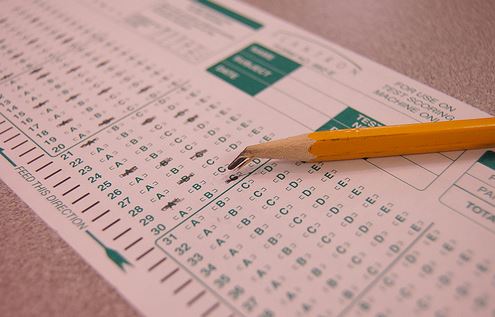In defense of the SAT

Google Image, labelled for reuse
Resistance to the SATs is growing but is it justified?
I took the SAT last weekend and it was fun!
No, just kidding. It was actually a gruelling experience where my only guide was the disinterested Fairfield-Ludlowe proctor scanning the room for cheaters (to no avail), my only neighbor was the kid next to me who incessantly cracked his knuckles in the interludes between sections and my only company was the clock periodically ticking away at the speed of light whenever I got into a sticky question. The hopelessness I felt while taking it was only compounded by the fact that’d I’d probably have to do it again. And again. And again. At least, until Spring of 2016 rolls around.
Yes, it was one of the shining moments of the notoriously busy junior year (next to the time my car battery died at Wakeman in 10 degree weather). At the end of the wasted Saturday, the only thing I had left was the three weeks separating me from results. That’s plenty of time to worry and chalk up all the questions I had a bad premonition about. Worst of all, this exhausting cycle determines (as many juniors who’ve poured money into tutors and prep will tell you) everything in college admissions. Everything.
Hold on there. That isn’t particularly true. But even if it were, to an extent, I would still readily defend this not-so-evil evil test.
I think the SAT certainly isn’t fun (What sociopath would?) but that doesn’t render it useless. It’s actually quite important and helpful to you (Yes, you, person who readily sacrificed 1/8th of their weekend). Don’t get me wrong, overemphasis on standardized tests is not a good idea, but I think there’s one problem that’s far worse for us as far as admissions go: grade inflation.Lets not forget the “standard” in “standardized tests.” We shouldn’t forget why we have them in the first place.
Let me put the problem of grade inflation this way: grades will always invariably vary between teachers. Think of a time you got an A- on an essay that would be branded B- in the class next to you, even at the same course level. You’re, on paper, getting the same academic challenge as your neighboring peers but shifting definitions have caused a gap in the harshness of an individual grade. Not all grades are created equal. A 93 to one teacher is a gold standard while, for others, it’s a routine grade for anyone who inputs enough effort. Now take this problem, this gap between teachers’ calibers in our school alone, and expand it to the entire country. The entire. Public school. System. Oh, and GPAs are adjusted accordingly.
Makes for a tricky college admissions game, right? Going up against schools where they’ve gone well past 5.0 on a GPA scale and trying to best students that work under completely different criteria? People who are viciously calling for the end of the SATs in the backlash against standardized tests these past few years labor under the erroneous assumptions that a. SATs unfairly decide everything in college admissions and b. that grade transcripts are an automatically incorruptible, cure-all replacement for standardized tests. Yet, as far as I can tell, the SAT, or any national exam for that matter, is the only cemented, unwavering measure for every single student at the moment: it gauges some necessary academic skills and it’s a pretty strong barometer.
Maybe grades will neatly level between all of the schools of the country and I can proudly support the abolition of the SAT. But, until that day comes, I’ll gladly head over to Fairfield or Wilton or Nowheretown and brave bored proctors, annoying neighboring test takers, and rapidly ticking clocks to waste a few Saturdays in the bigger process.
The news was a big part of Zach McCarthy’s life, and as he enters his senior
year, it still is. Growing up, the news was always playing in the background,...


















































